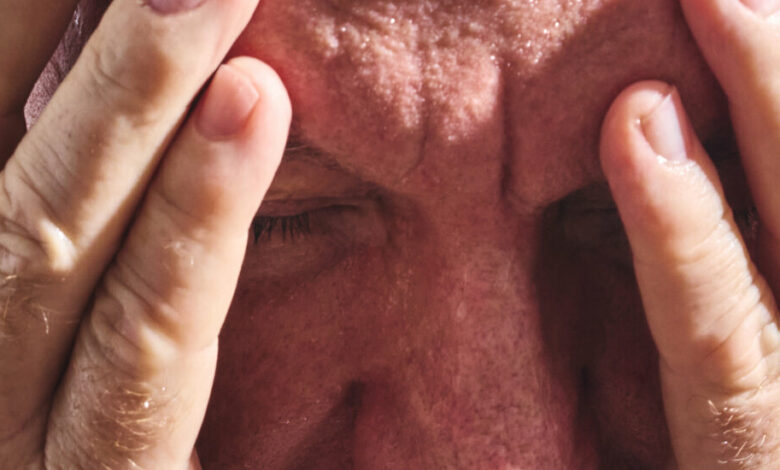Why do I feel so miserable when the humidity is high?

Q: Humidity makes me tired, irritable and nauseous. Why don’t I feel this way in drier heat? And how can I stay comfortable and safe?
It’s more than a feeling: humid weather is really harder on your body.
Humidity is a measure of water vapor in the air. And the warmer it gets, the more moisture the air can hold, says Jessica Lee, a public program coordinator with the National Weather Service. That’s why a muggy summer day can feel so much stickier than a foggy spring morning.
High humidity can also prevent your body from cooling down effectively, making the heat more dangerous. But experts say there are ways to stay safe — and sane.
Why Humidity Feels So Awful
The reason for this goes back to our favorite cooling mechanism: sweat.
When your body overheats, it sends a mixture of water and salt to the surface of your skin, where it exits your pores as sweat, said Dr. Anthony Mazzeo, a professor of emergency medicine at Penn Medicine. Sweat itself isn’t what cools you down, though. It’s the physics of evaporation.
“When sweat evaporates, it takes heat away from the body,” said Dr. Rahul Sharma, chief of emergency medicine at Weill Cornell Medicine and NewYork-Presbyterian Hospital. Liquid requires energy to evaporate. When sweat evaporates from our skin, it takes that energy away from our body heat, which cools us down.
The problem with high humidity is that the air is already full — or nearly full — of moisture, Dr. Mazzeo said. This prevents sweat from evaporating efficiently. When sweat can’t evaporate, your body can’t cool down. And when you can’t cool down, your body sweats even more.
“Sweat collects on the skin, making us feel clammy and uncomfortable,” says Dr. Sharma.
What happens to your body?
If your sweat can’t evaporate efficiently, your body has to work harder to stay cool, says Dr. Gauri Agarwal, an associate professor of clinical medicine at the University of Miami Miller School of Medicine. This can lead to fatigue and weakness.
And the more you sweat, the more dehydrated you become, which only adds to your fatigue, she said.
Another cooling mechanism your body uses is to divert warmer blood away from internal organs, including those in your digestive system, Dr. Agarwal said. This can make you feel sick.
High humidity can cause bronchial constriction, which means your airways narrow, Dr. Sharma added. This is most risky for people with asthma or chronic obstructive pulmonary disease, or COPD
Moist air also traps allergens and pollutants, he said, and mold grows more easily in humid conditions. All of which can make breathing difficult.
How do you stay safe?
Hot and humid weather can be miserable, but we can usually see it coming since most weather apps display relative humidity. Here’s how to prepare:
Hydrate. If the forecast looks humid, drink water before you feel thirsty, Dr. Agarwal advised. This will help prevent the dehydration that comes from sweating too much. Sports drinks, juices and foods high in water can also hydrate you. But if possible, avoid alcoholic beverages, which can dehydrate you even more, Dr. Mazzeo said.
Plan again. Intense activity can cause your body to overheat more quickly, says Dr. Kyle Enfield, an associate professor of medicine at the University of Virginia. If you’re planning a hike, long bike ride, or other strenuous exercise, it may be worth changing your schedule if you have the flexibility. You can also schedule outdoor workouts for the early morning or evening, when it’s cooler.
Seek shade. Many people don’t realize that the heat index — the “feels like” temperature in your weather app — is calculated for the shade, Ms. Lee said. In the sun, it can feel up to 15 degrees warmer, she said, so try to avoid direct sunlight.
Wear appropriate clothing. Lightweight clothing can make you more comfortable if you start sweating excessively, Dr. Agarwal said. Look for breathable fabrics.
Look for circulating air. If you have an air conditioner, a humid day is the time to use it. In addition to cooling the air, the machines also remove moisture from it. But if you don’t have air conditioning—one in 10 U.S. homes doesn’t—Dr. Mazzeo recommends opening windows and running cold water in front of a fan. This circulates cool air, which helps evaporate your sweat.
When you should worry
Heat-related illness is the leading weather-related cause of death in the United States, and humidity makes heat more dangerous. Babies and the elderly are especially vulnerable during extreme heat and humidity, Dr. Sharma said, as are people with health conditions such as diabetes or heart disease.
If you feel dizzy or confused, or if you notice someone vomiting or slurring their speech, it may be time to call 911, he said.




